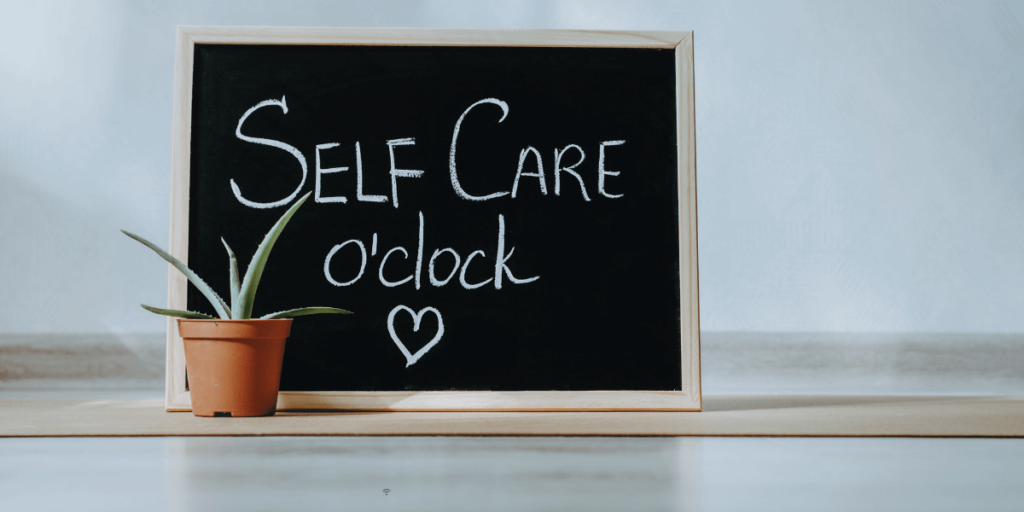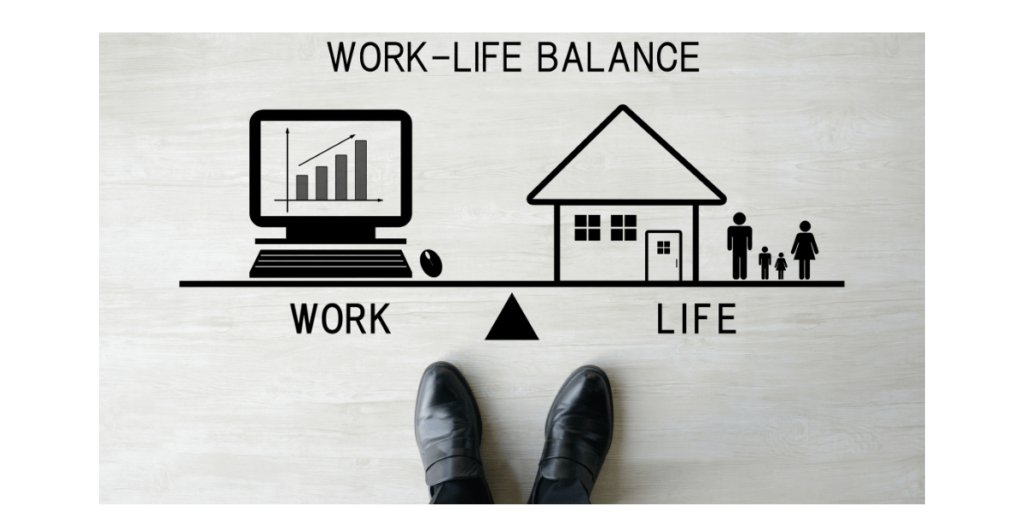In today’s fast-paced world, achieving work-life balance can often feel like an unattainable dream. Yet, it’s essential for maintaining mental health, physical well-being, and overall happiness. The concept centers around managing your work and personal life in a way that neither overwhelms you nor leaves you unfulfilled. Striking this delicate balance requires a thoughtful approach to allocating your time and resources among work commitments, personal activities, and relaxation.
Integral to achieving this balance is the practice of daily self-care. Self-care encompasses various activities and practices that we engage in regularly to reduce stress, improve well-being, and maintain a healthy relationship with ourselves. It’s not a one-size-fits-all solution but a personalized regimen that caters to individual needs and lifestyles.
Moreover, implementing daily self-care practices can dramatically improve productivity. When you feel rested, nourished, and mentally clear, it becomes easier to focus, make decisions, and accomplish tasks efficiently. It also fosters a positive work environment and elevates mood, which can significantly decrease work-related stress and burnout.
In this article, we’ll explore the different facets of daily self-care that contribute to work-life balance. From crafting the perfect morning routine to setting personal boundaries, we will delve into actionable strategies that can be easily integrated into your daily life. So, let’s embark on this journey toward achieving a harmonious balance between work and life.
Understanding the Concept of Work-Life Balance
The term “work-life balance” refers to the equilibrium between professional duties and personal activities. It means having ample time to excel in your job while also enjoying leisure activities and quality moments with loved ones. Attaining this balance requires understanding the demands of your job and finding a way to incorporate downtime into your schedule.
Achieving work-life balance can result in numerous benefits, including reduced stress levels, improved mental health, and a higher quality of life. Balancing work and personal life can make you more resilient and better equipped to handle challenges, both professionally and personally. It’s about finding a personalized rhythm that supports your overall well-being.
It’s important to note that work-life balance differs for everyone. For some, it might mean working fewer hours, while for others, it could be blending work with personal time seamlessly. The key is to identify what works best for you and to adopt practices that foster a healthy balance.
The Impact of Daily Self-Care on Overall Productivity
Daily self-care isn’t merely a trend; it is a cornerstone of maintaining holistic health. By engaging in activities that nourish your mind, body, and spirit, you set the foundation for a productive and fulfilling workday. Research shows that individuals who prioritize self-care are often more engaged and effective in their roles.
Implementing self-care routines like regular exercise, mindful meditation, or even hobbies can refresh your mental state and increase focus. This increased clarity can lead to better decision-making, streamlined workflows, and higher output quality. In essence, self-care can be seen as an investment in your professional effectiveness.
Furthermore, self-care practices also play a crucial role in stress relief. By managing stress through activities such as yoga, journaling, or simply taking breaks, you can avoid burnout and maintain your enthusiasm in your work. This not only enhances productivity but also fosters a more positive and creative work environment.
Creating a Morning Self-Care Routine
Starting your day with a structured morning routine can set a positive tone for the rest of the day. A good morning routine doesn’t have to be elaborate but should include activities that energize and prepare you for the day ahead.
- Mindful Activities: Incorporate mindfulness practices such as meditation or deep-breathing exercises. These practices can help center your mind and reduce anxiety, setting a calm and focused tone for your day.
- Physical Exercise: Engage in some form of physical activity, whether it’s a brisk walk, yoga, or a workout session. This helps in boosting energy levels and improving mood through the release of endorphins.
- Healthy Breakfast: A nutritious breakfast fuels your body for the day. Include a balance of protein, carbohydrates, and healthy fats to keep you satiated and energized.
| Activity | Benefit |
|---|---|
| Meditation | Reduces stress and anxiety |
| Physical Exercise | Boosts energy and mood |
| Healthy Breakfast | Provides necessary nutrients |
By establishing a morning routine that includes these elements, you create a solid foundation for a productive and balanced day. Mindful practices ensure mental clarity, exercise keeps your body active, and a nutritious breakfast fuels your day effectively.
The Role of Nutrition in Maintaining Energy Levels
What you eat profoundly affects your energy levels and overall productivity. A diet rich in whole foods, lean proteins, and healthy fats can help sustain energy throughout the day. Conversely, consuming processed foods and sugary snacks can lead to energy crashes and decreased performance.
To sustain energy:
- Hydration: Ensure you’re drinking enough water. Dehydration can lead to fatigue and hinder your cognitive functions.
- Nutrient-Dense Foods: Incorporate foods such as vegetables, fruits, whole grains, and lean proteins. These foods provide essential vitamins and minerals that support sustained energy.
- Balanced Meals: Aim for balanced meals that contain a mix of macronutrients. Avoid skipping meals, as this can lead to energy dips and decreased focus.
Here’s a sample meal plan to maintain energy levels:
| Meal | Food Examples |
|---|---|
| Breakfast | Oatmeal with fruits, scrambled eggs, and a smoothie |
| Snack | Greek yogurt with honey and nuts |
| Lunch | Grilled chicken salad with a variety of veggies and quinoa |
| Snack | Apple slices with almond butter |
| Dinner | Baked salmon, steamed broccoli, and sweet potato |
Eating right not only enhances your productivity but also supports your overall physical and mental health. Prioritizing nutrition is an essential aspect of any self-care routine aimed at achieving work-life balance.
Using Exercise to Combat Work Stress
Exercise is a proven method for alleviating work stress and improving mental health. Physical activity produces endorphins, which are natural mood elevators. Additionally, exercise provides a productive outlet for stress and can serve as a break from the mental demands of work.
To incorporate exercise into your routine:
- Find What You Enjoy: Whether it’s jogging, swimming, biking, or a fitness class, choose activities that you find enjoyable. This increases the likelihood of maintaining consistency.
- Set Realistic Goals: Establish achievable fitness goals, such as 30 minutes of exercise five days a week. Gradual progress can keep you motivated.
- Break Up Exercise: If you find it hard to fit long workout sessions into your day, break up your exercise into shorter sessions. Even 10-minute bursts of activity can be beneficial.
| Exercise Type | Duration | Frequency |
|---|---|---|
| Cardio | 30 mins | 3-5 times weekly |
| Strength | 20 mins | 2-3 times weekly |
| Flexibility | 15 mins | Daily |
By integrating regular exercise into your daily self-care regimen, you can significantly reduce stress and improve your resilience to work-related pressures, fostering a healthier and more productive work environment.
Practicing Mindfulness at Work
Mindfulness at work involves being fully present and engaged in your tasks. This practice can improve focus, reduce stress, and enhance overall job satisfaction. By developing a mindful approach, you can minimize distractions and respond to work challenges more effectively.
Incorporate mindfulness through:
- Mindful Breaks: Take short breaks to practice deep breathing or meditation. Close your eyes and focus on your breath to reset your mind.
- Mindful Listening: When interacting with colleagues, practice active listening and being present. This fosters better communication and teamwork.
- Task Management: Focus on one task at a time. Multitasking can lead to reduced productivity and increased stress.
Mindfulness isn’t about eliminating stress but rather managing it more effectively. By becoming more aware of your thoughts and reactions, you can navigate your workday with greater ease and presence.
Setting Boundaries to Protect Personal Time
Setting boundaries is crucial for achieving work-life balance. Clear boundaries help protect your personal time and ensure that work does not encroach on your personal life. Establishing these boundaries requires communication and commitment.
Strategies for setting boundaries:
- Define Work Hours: Clearly demarcate your work hours and stick to them. Inform colleagues and supervisors of your availability.
- Disconnect: Limit work-related communications outside of your designated work hours. Turn off email notifications and resist the urge to check messages.
- Delegate Tasks: Learn to delegate tasks and seek support when necessary. Trying to handle everything on your own can lead to burnout.
By setting boundaries, you create a distinction between work and personal life, allowing you to recharge and engage in self-care activities without the guilt of unfinished work tasks looming over you.
Utilizing Breaks Effectively Throughout the Day
Taking regular breaks throughout the workday is essential for maintaining productivity and reducing fatigue. Short breaks can help you recharge, refocus, and return to your tasks with renewed energy.
Effective break strategies include:
- Pomodoro Technique: Work for 25 minutes and then take a 5-minute break. After four cycles, take a longer break of 15-30 minutes.
- Physical Activity: Use breaks to stretch, walk, or do light exercises. Physical movement can invigorate your body and mind.
- Mindful Rest: Practice mindfulness or deep breathing exercises during breaks to relax and clear your mind.
| Break Type | Duration |
|---|---|
| Short Break | 5 mins |
| Physical Break | 10 mins |
| Long Break | 15-30 mins |
Regular breaks not only help in preventing burnout but also improve overall efficiency. By incorporating strategic breaks into your daily routine, you foster a healthier and more balanced work environment.
Crafting a Relaxing Evening Routine
An evening routine is as important as a morning routine for maintaining work-life balance. A structured evening routine can help you wind down and prepare for restful sleep, which is crucial for overall well-being.
Elements of a relaxing evening routine:
- Unplug: Disconnect from electronic devices at least an hour before bedtime to reduce blue light exposure and promote relaxation.
- Calm Activities: Engage in calming activities such as reading, journaling, or taking a warm bath. These activities can help de-stress and signal to your body that it’s time to wind down.
- Set the Environment: Create a peaceful sleep environment by ensuring your bedroom is cool, dark, and quiet. Consider using aromatherapy with lavender or chamomile to promote relaxation.
| Activity | Benefit |
|---|---|
| Unplugging | Reduces blue light exposure |
| Calm Activities | Promotes relaxation |
| Sleep Environment | Enhances sleep quality |
Establishing a consistent evening routine can greatly improve sleep quality and overall health, contributing to a better work-life balance.
Importance of Sleep in Achieving Balance
Sleep is often the first thing compromised in the quest for productivity, but it is vital for work-life balance. Quality sleep restores your body, improves cognitive function, and enhances emotional well-being.
To improve sleep:
- Consistent Schedule: Maintain a consistent sleep schedule by going to bed and waking up at the same time every day, even on weekends.
- Sleep Hygiene: Adopt good sleep hygiene practices such as avoiding caffeine and heavy meals before bedtime, and creating a comfortable sleep environment.
- Relaxation Techniques: Practice relaxation techniques such as meditation or deep breathing before bed to calm your mind.
Lack of sleep can lead to decreased productivity, impaired decision-making, and increased stress. Prioritizing sleep is essential for maintaining energy levels and overall well-being, making it a critical component of achieving work-life balance.
Regular Assessment of Your Self-Care Strategies
Regularly assessing and adjusting your self-care strategies ensures they remain effective and aligned with your needs. Life circumstances and work demands change, and your self-care practices should evolve accordingly.
Steps for regular assessment:
- Self-Reflection: Take time to reflect on your physical, emotional, and mental well-being. Identify areas that need improvement.
- Adjust Practices: Modify your self-care routines as needed. What worked previously might not be effective now, so be flexible and open to change.
- Seek Feedback: Consult with friends, family, or professionals to gain insights into your self-care practices and receive constructive feedback.
By continually evaluating your self-care strategies, you can make informed adjustments that enhance your work-life balance and overall quality of life.
Conclusion
Achieving work-life balance is a continuous journey that requires mindful effort and regular adjustments. Daily self-care practices play a pivotal role in maintaining this balance by reducing stress, enhancing productivity, and promoting overall well-being.
Incorporating a structured morning routine, mindful eating, regular exercise, and effective break strategies can set a solid foundation for a balanced day. Setting boundaries and crafting a relaxing evening routine further ensure that your personal time is protected and that you get the restorative sleep needed for optimal functioning.
Remember that achieving balance is a personalized endeavor; what works for one person might not work for another. Regularly assess your self-care strategies and be willing to adapt and change as needed. By doing so, you can create a harmonious blend of work and personal life that promotes happiness and fulfillment.
Recap
- Work-Life Balance: It’s about managing professional and personal commitments to avoid burnout and lead a fulfilling life.
- Daily Self-Care: Integral to maintaining productivity and overall well-being.
- Morning Routine: Set a positive tone with mindful activities, physical exercise, and a healthy breakfast.
- Nutrition: Maintain energy levels with a balanced diet and proper hydration.
- Exercise: Alleviates work stress and boosts mood and energy.
- Mindfulness: Enhances focus and reduces stress at work.
- Boundaries: Protect personal time and prevent work from encroaching on your personal life.
- Breaks: Regular breaks improve efficiency and prevent burnout.
- Evening Routine: Prepare for restful sleep with calming activities.
- Sleep: Prioritize quality sleep for better cognitive function and emotional well-being.
- Self-Care Assessment: Regular evaluation ensures self-care practices are effective and relevant.
FAQ (Frequently Asked Questions)
Q1: What is work-life balance?
A1: Work-life balance refers to managing your professional and personal responsibilities in a way that reduces stress and promotes overall well-being.
Q2: How can daily self-care practices improve productivity?
A2: Daily self-care practices improve productivity by reducing stress, increasing focus, and enhancing overall mental and physical health.
Q3: Why is a morning routine important?
A3: A morning routine sets a positive tone for the day, preparing your mind and body for optimal performance.
Q4: What role does nutrition play in maintaining energy levels?
A4: Proper nutrition provides essential nutrients and energy, sustains cognitive functions, and prevents energy crashes.
Q5: How can exercise help combat work stress?
A5: Exercise releases endorphins that elevate mood and reduce stress, providing a healthy outlet for tension.
Q6: What are effective ways to practice mindfulness at work?
A6: Effective mindfulness practices include taking mindful breaks, practicing deep breathing, and focusing on one task at a time.
Q7: How can setting boundaries help achieve work-life balance?
A7: Setting boundaries ensures that work does not encroach on personal time, allowing you to recharge and engage in self-care activities.
Q8: Why is sleep important for work-life balance?
A8: Quality sleep improves cognitive function, emotional well-being, and overall productivity, making it essential for maintaining work-life balance.
References
- Smith, J. (2020). The Importance of Work-Life Balance. Wellness Publishing.
- Doe, A. (2019). Nourishment and Productivity: A Comprehensive Guide. Nutrition Press.
- Lee, M. (2021). Mindfulness at Work: Techniques and Benefits. Mindfulness Media.



